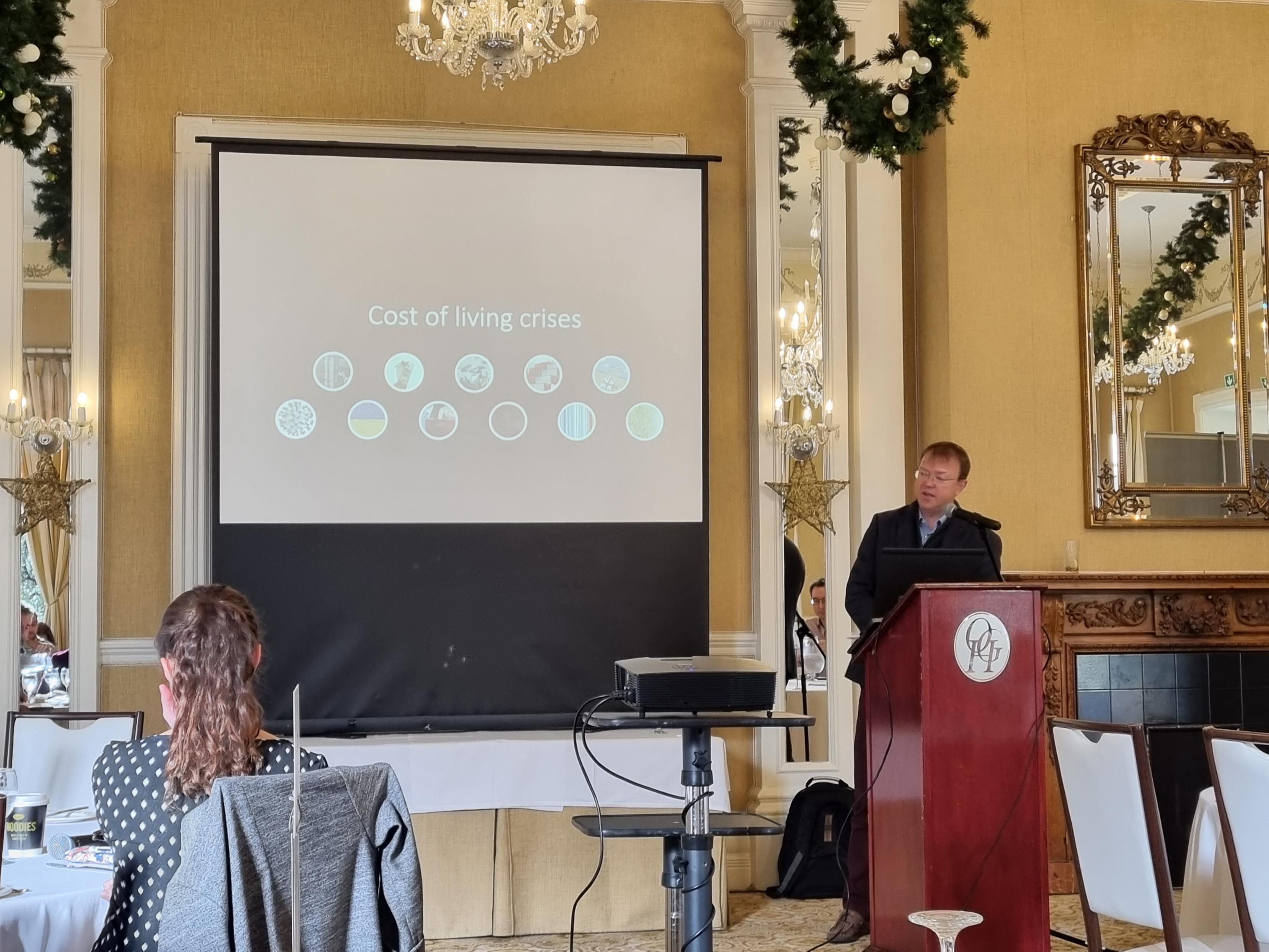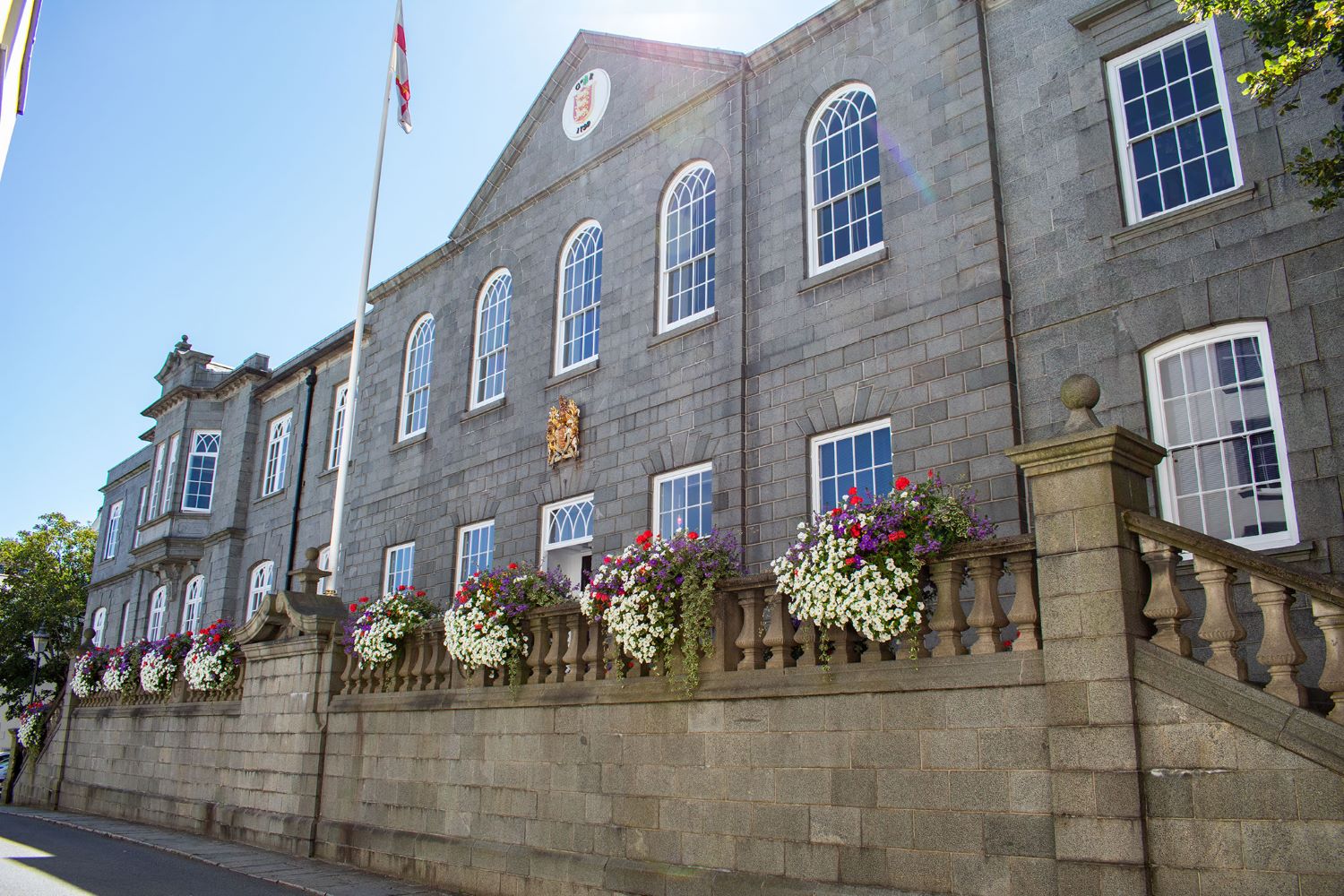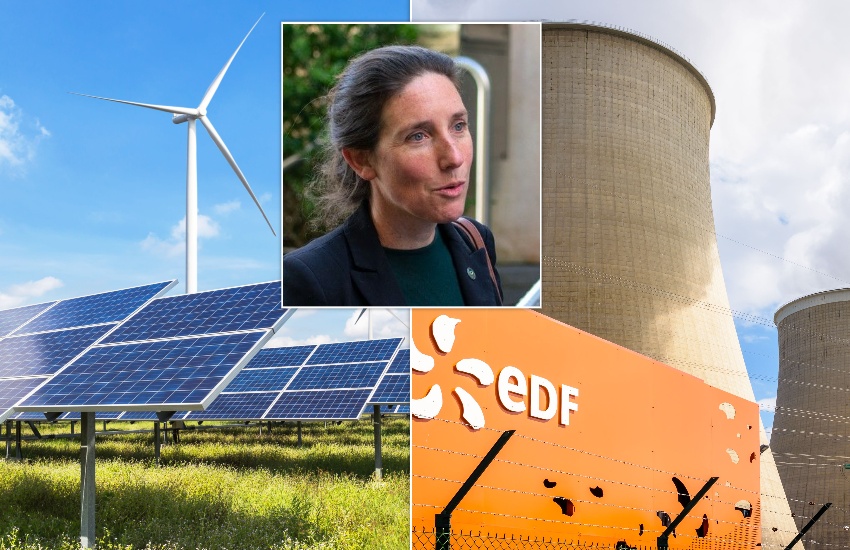


A local investment actuary believes working closer with Jersey, reducing food waste, “building up”, and developing greater energy independence will all help Guernsey move away from a “very vulnerable position”.
In a wide-ranging talk to Chamber of Commerce members, Martyn Dorey said he was “absolutely shocked at just how desperate this problem is… our behavior as humans is coming back to bite us in the butt”.
He cited Office for National Statistics data where the 45-54 age group were surprisingly the most likely group to report finding it “quite or very difficult to get by” in the present circumstances.
Throughout the talk he offered his thoughts on the cost-of-living crisis felt both at home and abroad.

Pictured: Mr Dorey addressing members at the OGH on Monday.
Mr Dorey told a story of economic cycles, starting with the dot-com boom and bust era of the late 1990’s and early 2000’s.
He said it took “three years to recover from that”, with governments printing money and injecting it back into the economy. But this resulted in another crash, linked with an eye-watering housing bubble in the United States.
Again, the international response was to print money and cut interest rates to historic lows.
He suggested that when poverty increases, political polarization increases leading to a Trump and Brexit-type reaction at the polls.
Mr Dorey argued that current inflationary and geopolitical pressures truly began “with the kickoff of the US and China trade war” in 2018 and was at pains to deflect blame for current issues away from just the pandemic and Russia-Ukraine war.
Nevertheless, he said it was “extraordinary” that the UK officially exited the European Union on the same day the first confirmed case of covid-19 was identified in the country.

Pictured: The cost of basic goods and services is at a 40-year high.
Guernsey's working population is down whilst the effects of climate change are increasing, both of which affect prices here and now according to Mr Dorey, who feared that “we’re not being reactive enough to climate change”.
There is currently a “European phenomenon” of lots of job vacancies but not enough people to fill them: “I’ve never seen unemployment move so quickly… but it's surprising just how fast it accelerated up and went beyond pre-covid unemployment levels”.
“We’re in a very, very vulnerable position. Here we are again… the economy is running hot,” he said, pointing out that history suggests an economic downturn is likely and the warning signs are already showing.
The UK Government’s September 2022 ‘mini budget’ sparked both a sterling crisis and led to emergency gilt measures being enacted by the Bank of England. Across the pond, big tech companies such as Meta have seen considerable corrections in their stock values.
He labelled the mini budget “utter stupidity” and refrained from using harsher words: “Liz Truss and Kwasi Kwarteng thought you could grow your way out of a recession”.
Mr Dorey said he was pleased to now see “adults” in charge of the UK.

Pictured: Mr Dorey took aim at the States of Guernsey.
Mr Dorey said more trust is required between the public and the States, and between individual politicians who can be perceived as working in “silos” apart from each other which means “we’re not strategically approaching challenges”.
He said the private sector needs to be encouraged to contribute more since States capital investment into infrastructure is “close to 0%”, with no standalone officer tasked with addressing this.
He hoped that the new Guernsey Development Company could assist by working to build relationships with funding bodies and the public.
Mr Dorey claimed there are obsessions in Guernsey “with having a detached house in a clos” which are not realistic.
“We need to build up and start reversing ribbon development”, he said, adding: “Many people would like to live in a flat”.
He also said the best way to increase productivity in Guernsey is to “work closer with Jersey” and bemoaned tribal views of the neighboring island and its people.
“I’ve got a few ideas about how to do that,” he said, alluding to his idea for a train tunnel link with between the islands.

Pictured: Guernsey's fresh energy strategy is expected to be published in the first quarter of next year.
Mr Dorey highlighted that the hottest temperatures ever recorded in China and India came this year, to the point where some factories had to stop operating due to unbearable heat.
He also noted the high temperature induced wildfires in southern France, which could’ve destroyed many vineyards had temperatures been marginally higher.
“We’re on a bit of a knife edge” regarding climate risks, Mr Dorey said.
The cost of food, driven up by international sanctions, crop failures, and logistics failures, is one of the key drivers of current inflationary pressures. At the same time, 17% of food ends up in the bin in Britain.
Mr Dorey said not wasting food is a simple way to partly correct the current situation: “If we waste less, prices will come down”.
He also noted the fragility of the UK’s reliance on North Sea gas but said there is a plan to “replace North Sea gas with North Sea wind”, with a hope to generate 50GW renewably by 2030 which would “completely transform the UK as an energy importer to an energy exporter”.
There is also “massive innovation” in heat pump technology such as small domestic integrated pumps.
Mr Dorey argued that innovation in the domestic energy space will eventually “hit a tipping point when suddenly everyone will have to go green” due to a large enough segment of the population moving away from ‘conventional’ fuels.
The infrastructure and maintenance costs associated with fossil fuels will lead to unaffordable price rises once enough people have transitioned to renewables, he added.
Comments
Comments on this story express the views of the commentator only, not Bailiwick Publishing. We are unable to guarantee the accuracy of any of those comments.